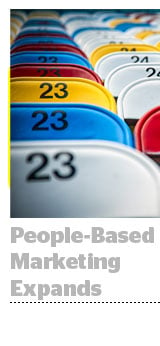 Merkle is introducing Publisher Addressable Marketplaces, which matches its advertisers’ CRM data with publishers’ subscriber data in order to target real people through partners like Pandora, Trusted Media Brands, Viant and LiveIntent.
Merkle is introducing Publisher Addressable Marketplaces, which matches its advertisers’ CRM data with publishers’ subscriber data in order to target real people through partners like Pandora, Trusted Media Brands, Viant and LiveIntent.
Publisher Addressable Marketplaces’ data onboarding and targeting capabilities are similar to Facebook’s hugely successful CRM matching program Custom Audiences, and its introduction comes as more brands want to move from cookie targeting to people-based targeting.
Merkle Chief Strategy Officer John Lee expects that the Publisher Addressable Marketplaces will, over the next six to 12 months, expand its publisher partners from four to between 20 and 30.
The company also anticipates Publisher Addressable Marketplaces will command a large share of programmatic spend on media plans.
“Our forecast would say 20% to 30% of Merkle’s programmatic spending in the next 12 to 18 months will run through Publisher Addressable Marketplaces,” Lee said. About 15 of its advertisers are testing Publisher Addressable Marketplaces, which is open to non-Merkle advertisers too.
Targeting based on real people is something the ad tech, agency and publishing worlds have been building toward for some time. Indeed, Facebook’s solution has been on the market since 2013, and Google started to do customer matching in AdWords last year.
While custom one-off CRM-matching projects with publishers are possible, they require a great deal of manual work for both advertisers and publishers.
With Publisher Addressable Marketplaces, Merkle is building the pipes to transact such deals more automatically. In some cases, publishers will use the Sonobi platform in order to connect.
In the case of Pandora, the connection builds on work done for CRM-matching programs between the two companies last year, said Dave Smith, VP of monetization and yield for Pandora.
Merkle’s work to connect its clients’ CRM data to publishers’ data signals a shift in how buyers and sellers will work together.
With the rise of people-based advertising, advertisers are evaluating publishers based on how well they collect and use readers’ deterministic data (PCH is already executing on this). Publishers with strong data capabilities “will naturally rise to the top of the plan through performance,” Lee said.
Pandora’s Smith expects 10% to 20% of the company’s overall ad revenue to come from channels where CRM matching is possible. He noted marketers who first used CRM-based targeting saw at least twice the ROI, even with higher pricing.
One common issue with targeting campaigns using CRM data is lack of scale. Good match rates can range from 30% to over 60%, according to Merkle. Pandora’s Smith reported similar numbers, and said good mobile device IDs from partners can push match rates to the 60%-plus range.
Consequently, lookalike functionalities are on Publisher Addressable Marketplaces’ road map, Lee said. But some of Merkle’s publisher partners, such as Pandora, can perform lookalike modeling on their end based on unique attributes like listening behavior.
Merkle’s hope is that the connections formed through Publisher Addressable Marketplaces will help publishers with strong customer data sets compete with the likes of Facebook and Google.
“The stat now is that between 80 and 85 cents of every dollar are going to Facebook and Google,” Lee said. “We are huge proponents of what Facebook and now increasingly Google are doing in bringing true people-based inventory to market. But more direct deals with premium pubs that are people-based could bring democratization and balance to the ecosystem.”













